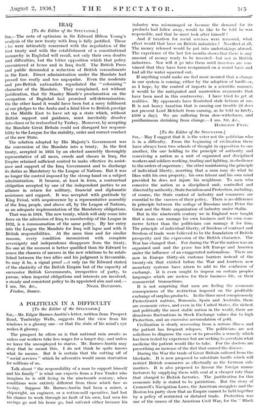IRAQ
[To the Editor of the SPECTATOR.] SIR,—The note of optimism in Sir Edward Hilton Young's analysis of the new treaty with Iraq is fully justified. Those
ho were intimately concerned with the negotiation of the first treaty and with the establishment of a constitutional monarchy in Baghdad will recall, not only their own doubts and difficulties, but the bitter opposition which that policy encountered at home and in Iraq itself. The British Press and public demanded a reduction of British commitments in the East. Direct administration under the Mandate had proved too costly and too unpopular. Even the moderate and pro-British nationalists repudiated the " colonizing " character of the Mandate. They complained, not without justification, that Sir Stanley Maude's proclamation on the occupation of Baghdad had promised self-determination. On the other hand it would have been but a sorry fulfilment of our pledges to the Arabs and a fatal blow to British prestige in the Middle East to have set up a state which, without British support and guidance, must inevitably dissolve into chaos or be reabsorbed by Turkey. Moreover, by accepting the Mandate Great Britain could not disregard her responsi- bility to the League for the stability, order and correct conduct of the new State.
The solution adopted by His Majesty's Government was the conversion of the Mandate into a treaty. In the first treaty, accepted in 1924 by an elected assembly thoroughly representative of all races, creeds and classes in Iraq, the Empire retained sufficient control to make effective its assist- ance and support of the Iraq Government and to discharge its duties as Mandatory to the League of Nations. But it was no longer the control imposed by the strong hand on a subject administration. It became, at least in form, a contractual obligation accepted by one of the independent parties to an alliance in return for military, financial and diplomatic assistance and support. It was accepted with gratitude by King Feisal, with acquiescence by a representative assembly of the Iraq people, and above all, by the League of Nations, as an adequate implementation of the Mandatory obligations.
That was in 1924. The new treaty, which will only come into force on the admission of Iraq to membership of the League in 1932, is a consummation of the same policy. By her entry into the League the Mandate for Iraq will lapse and with it British responsibilities. At the same time and for similar reasons, every condition inconsistent with complete sovereignty and independence disappears from the treaty. No one at the moment is better qualified than Sir Edward to assess the chances of success in the new relations to be estab- lished between the two allies and his judgment is favourable. So may it be, a signal proof .,.ot only (as Sir Edward states) of the elasticity of the British Empire but of the capacity of successive British Governments, irrespective of party, to pursue, when imperial obligations and interests are involved, a steady and consistent policy to its appointed aim and end.—
































 Previous page
Previous page